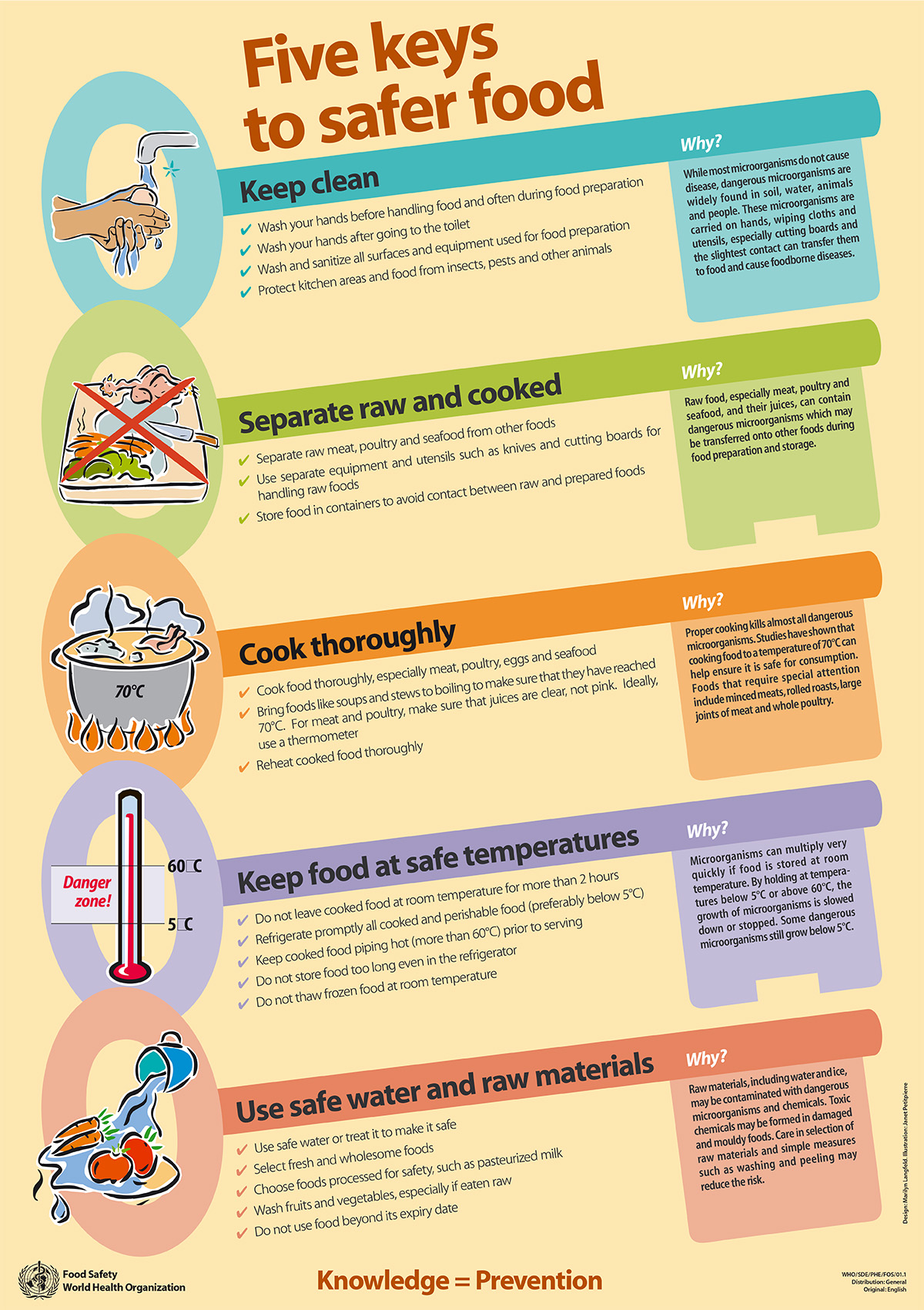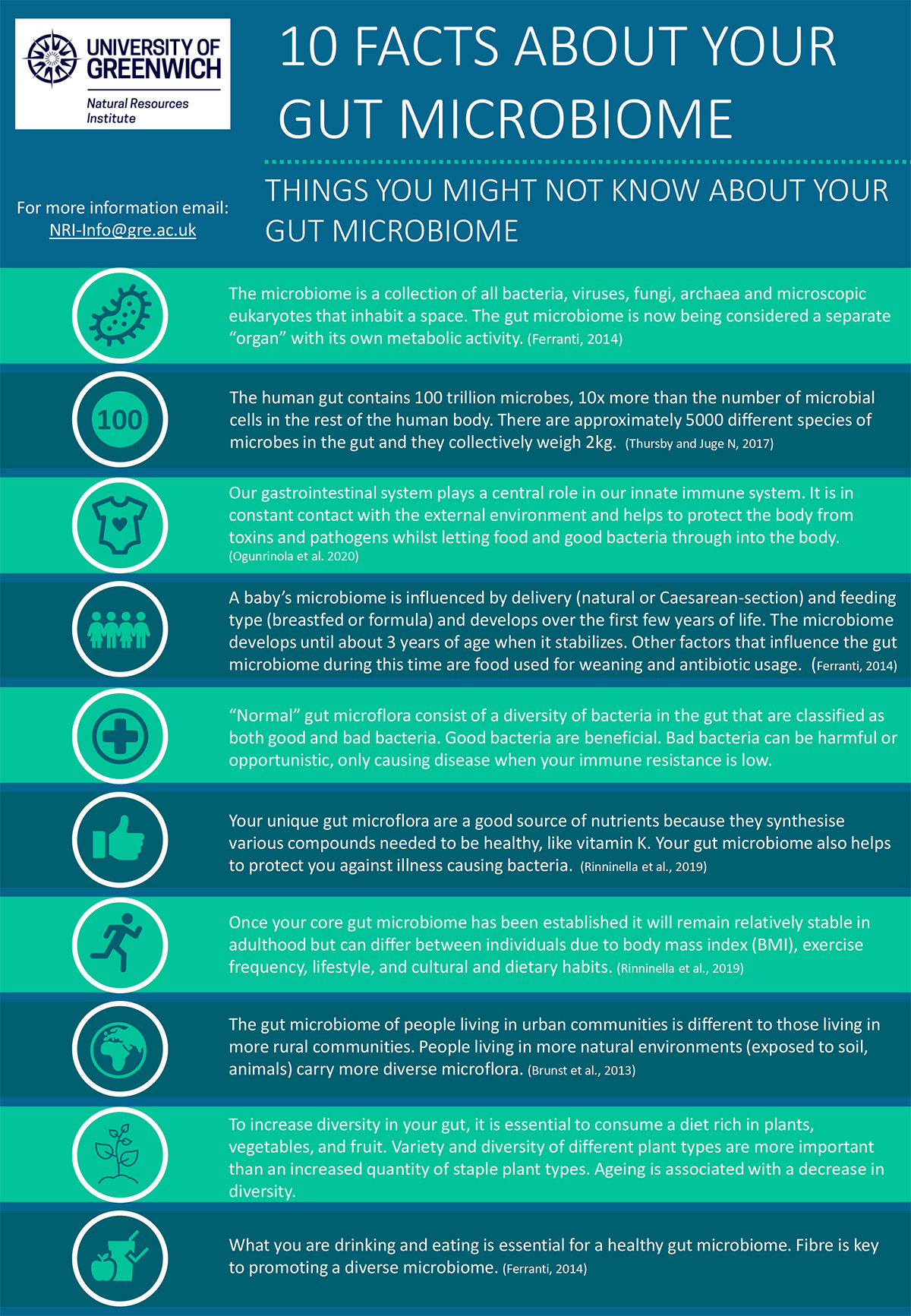Promoting food safety through consumer awareness, is an important strategy to increase the health and wellbeing of the global population. With this in mind, and as part of the Growing Kent and Medway’s business innovation voucher project, NRI’s Dr Stacey Duvenage and Fermenti’s Marie-Laure Prevost joined forces to promote food safety and the importance of a healthy gut microbiome.
On Saturday, 3 June 2023, Stacey, Marie and three Student Ambassadors (Tina Elza Philip, Ganga Shaileshkumar and Betsy Rachel Jacob) visited Hempstead Valley Shopping Centre to speak to members of the public in Medway about safe food safety practices and a healthy gut microbiome.
 The 5 keys to safer food leaflet, developed by the World Health Organization (WHO, 2006), was used to discuss the importance of safe food practices with members of the public. Some of whom admitted that they did not ‘wash apples prior to eating’, nor ‘wash hands before taking an apple to eat’, both of which are good safe food handling practices. The 5 keys to safer food leaflet was used to discuss the importance of keeping hands and surfaces clean, separating raw and cooked foods, cooking thoroughly, keeping foods at safe temperatures and using safe water and raw materials. Further messages emphasised how important it is to ensure that safe food handling practices are always followed, and moreover, that good gut bacteria can further help to protect against harmful bacteria.
The 5 keys to safer food leaflet, developed by the World Health Organization (WHO, 2006), was used to discuss the importance of safe food practices with members of the public. Some of whom admitted that they did not ‘wash apples prior to eating’, nor ‘wash hands before taking an apple to eat’, both of which are good safe food handling practices. The 5 keys to safer food leaflet was used to discuss the importance of keeping hands and surfaces clean, separating raw and cooked foods, cooking thoroughly, keeping foods at safe temperatures and using safe water and raw materials. Further messages emphasised how important it is to ensure that safe food handling practices are always followed, and moreover, that good gut bacteria can further help to protect against harmful bacteria.
 We further used Megan Rossi's quiz in Daily Mail (https://www.dailymail.co.uk/health/article-10822587/Dr-MEGAN-ROSSI-simple-quiz-track-happy-gut.html) to assess individual gut health and started the discussion on the importance of healthy gut bacteria. Most members of the public that participated were assessed as having ‘not bad’ gut health. Following the informal quiz, a leaflet, ‘10 facts about your gut microbiome’ was used to spark a conversation about healthy gut bacteria. We emphasised that the human gut contains 100 trillion microbes that collectively weigh 2kg (Thursby and Juge, 2017). There is a diversity of bacteria in the gut that are classified as either good or bad bacteria (Ferranti et al., 2014). Good bacteria are beneficial; bad bacteria can be harmful or opportunistic, only causing disease when your immune resistance is low. Further to this, we emphasised that the gastrointestinal system plays a central role in our immune system and helps to protect the body from harmful microorganisms whilst letting food and good bacteria through into the body (Ogunrinola et al. 2020).
We further used Megan Rossi's quiz in Daily Mail (https://www.dailymail.co.uk/health/article-10822587/Dr-MEGAN-ROSSI-simple-quiz-track-happy-gut.html) to assess individual gut health and started the discussion on the importance of healthy gut bacteria. Most members of the public that participated were assessed as having ‘not bad’ gut health. Following the informal quiz, a leaflet, ‘10 facts about your gut microbiome’ was used to spark a conversation about healthy gut bacteria. We emphasised that the human gut contains 100 trillion microbes that collectively weigh 2kg (Thursby and Juge, 2017). There is a diversity of bacteria in the gut that are classified as either good or bad bacteria (Ferranti et al., 2014). Good bacteria are beneficial; bad bacteria can be harmful or opportunistic, only causing disease when your immune resistance is low. Further to this, we emphasised that the gastrointestinal system plays a central role in our immune system and helps to protect the body from harmful microorganisms whilst letting food and good bacteria through into the body (Ogunrinola et al. 2020).
Members of the public were further encouraged to improve the diversity of their gut bacteria through consumption of at least 30 different plant products per week as fruit and vegetables are the best source of nutrients, with high levels of fibre and they contribute to healthy gut bacteria. Even through members of the public were typically not consuming fermented products (except for yoghurt and beer), we encouraged them to include fermented products in their diet like kefir, kombucha, and sauerkraut which are lacto-fermented (a fermented food product where lactic acid bacteria are responsible for the fermentation much like that of sauerkraut) and contain bacteria which are very beneficial for their gut bacteria.
References:
- Ferranti, E., Dunbar, S.B., Dunlop, A.L. and Corwin, E.J. (2014) 20 things you didn’t know about the human gut microbiome. The Journal of cardiovascular nursing, 29(6), p.479.
- Ogunrinola, G.A., Oyewale, J.O., Oshamika, O.O. and Olasehinde, G.I. (2020) The human microbiome and its impacts on health. International Journal of Microbiology, 2020.
- Thursby, E. and Juge, N. (2017). Introduction to the human gut microbiota. Biochemical journal, 474(11), pp.1823-1836.
- World Health Organisation (2006). Five Keys to Safer Food Manual. WHO Press, Geneva, Switzerland.

